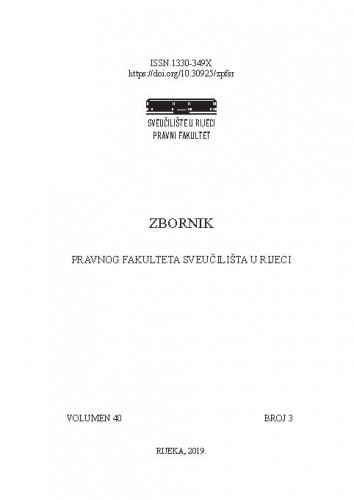The paper presents the regulation of the applicable law as determined in Council Regulation (EU) 2016/1103 of 24 June 2016 implementing enhanced cooperation in the area of jurisdiction, applicable law and the recognition and enforcement of decisions in matters of matrimonial property regimes. It concludes that the new EU arrangement has made it easier for spouses to determine the applicable law and evaluates the suitability of the connecting factors provided by Regulation 2016/1103. The paper also challenges the examination of these connecting factors as of the time of the conclusion of the marriage and assumes that their exclusion under exceptional circumstances is difficult to achieve. It compares the connecting factors with those provided by Slovenian and Croatian private international law in theory, and provides practical examples of the differences resulting from the new European arrangement. The paper further examines the hypothesis that the possibility of agreement on the choice of law will cause many problems in practice, and provides possible solutions. Throughout the paper, the system established by Regulation 2016/1103 is compared with other European regulations and the relevant case law of the CJEU, but the author primarily focuses on the changes in Slovenian and Croatian case law caused by the application of Regulation 2016/1103.; 2016/1103 od 24. lipnja 2016. o provedbi pojačane suradnje u području nadležnosti, mjerodavnog prava te priznavanja i izvršenja odluka u stvarima bračnoimovinskih režima. Dolazi se do zaključka da je nova europska Uredba olakšala bračnim drugovima određenje mjerodavnog prava te se vrednuje primjerenost povezujućih čimbenika predviđenih u Uredbi. Rad dovodi u pitanje te povezujuće čimbenike u trenutku zaključenja braka i pretpostavlja da ih je teško isključiti u izvanrednim okolnostima. Ti se čimbenici uspoređuju s onima iz teorije slovenskog i hrvatskog međunarodnog privatnog prava, a u radu se nude praktični primjeri za razlike proizašle iz novog europskog uređenja. U radu se nadalje istražuje hipoteza da će mogućnost sporazuma o izboru mjerodavnog prava u praksi prouzročiti probleme te se za to nude moguća rješenja. U cijelom se radu uspoređuje sustav uveden Uredbom Vijeća (EU) 2016/1103 s drugim europskim uredbama i relevantnom sudskom praksom Suda Europske unije, ali se autorica ponajviše usredotočuje na promjene koje je navedena Uredba donijela u slovensko i hrvatsko pravo.; Dieser Beitrag stellt das in der Verordnung (EU) 2016/1103 des Rates vom 24. Juni 2016 zur Durchführung einer Verstärkten Zusammenarbeit im Bereich der Zuständigkeit, des anzuwendenden Rechts und der Anerkennung und Vollstreckung von Entscheidungen in Fragen des ehelichen Güterstands festgelegte anzuwendende Recht dar. Man kommt zu der Schlussfolgerung, dass die neue EU-Regelung es den Ehepartnern erleichtert hat, das anzuwendende Recht zu bestimmen, und bewertet die Eignung der in der Verordnung (EU) 2016/1103 vorgesehenen Anknüpfungspunkte. Der Beitrag stellt diese Anknüpfungspunkte zum Zeitpunkt des Abschlusses der Ehe in Frage und geht davon aus, dass deren Ausschließen unter außergewöhnlichen Umständen schwer zu erreichen ist. Der Beitrag vergleicht diese Anknüpfungspunkte mit denen, die in der Theorie des slowenischen und des kroatischen internationalen Privatrechts angeboten werden, und liefert praktische Beispiele für die Unterschiede, die sich aus der neuen europäischen Regelung ergeben. Der Beitrag untersucht ferner die Hypothese, dass die Möglichkeit der Rechtswahlvereinbarung in der Praxis viele Probleme bereiten wird, und stellt dafür mögliche Lösungen dar. Im gesamten Beitrag wird das mit der Verordnung (EU) 2016/1103 eingeführte System mit anderen europäischen Verordnungen und der einschlägigen Rechtsprechung des EuGH verglichen. Die Autorin konzentriert sich jedoch hauptsächlich auf die Änderungen der slowenischen und kroatischen Rechtsprechung, die durch die Anwendung der Verordnung (EU) 2016/1103 verursacht wurden.; Nel lavoro si presenta la disciplina concernente la legge applicabile come dettata dal Regolamento (UE) 2016/1103 del Consiglio, del 24 giugno 2016, che attua la cooperazione rafforzata nel settore della competenza, della legge applicabile, del riconoscimento e dell’esecuzione delle decisioni in materia di regimi patrimoniali tra coniugi. Se ne ricava che le nuove soluzioni europee hanno reso per i coniugi più semplice determinare la legge applicabile. Nel lavoro si valuta altresì la sostenibilità dei criteri di collegamento offerti dal Regolamento 2016/1103. Inoltre mediante l’indagine condotta si tenta la disamina di criteri di collegamento, quali il tempo di conclusione del matrimonio e si conclude come la loro esclusione in circostanze eccezionali sia difficile da realizzare. Nel contributo si paragonano altresì i criteri di collegamento con quelli previsti dal diritto internazionale privato sloveno e da quello croato nella teoria; inoltre, si offrono esempi pratici delle differenze risultanti dalle nuove soluzioni prospettate sul piano europeo. Nel prosieguo si disamina l’ipotesi che la possibilità di accordo circa la scelta della legge applicabile potrebbe causare molte questioni nella prassi e si offrono possibili soluzioni. Nel corso dell’indagine condotta il sistema fissato dal Regolamento 2016/1103 viene comparato con altri regolamenti, come anche con la giurisprudenza della Corte di Giustizia dell’UE; benché l’autore in primo luogo si concentra sui cambiamenti nella giurisprudenza slovena ed in quella croata occorsi con l’entrata in vigore del Regolamento 2016/1103.
Sažetak

 Zbornik Pravnog fakulteta Sveučilišta u Rijeci : 40,3(2019) / glavni urednik Željko Bartulović.
Zbornik Pravnog fakulteta Sveučilišta u Rijeci : 40,3(2019) / glavni urednik Željko Bartulović.